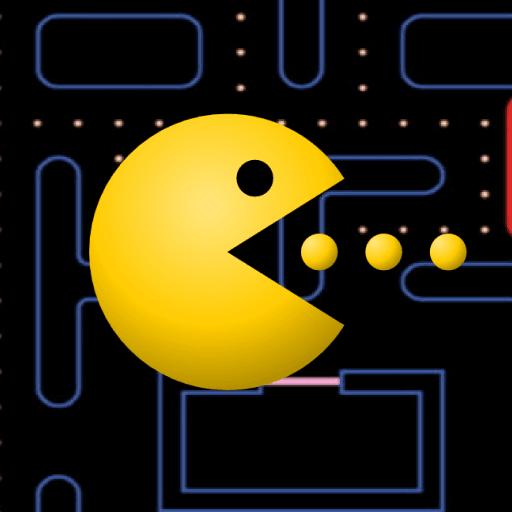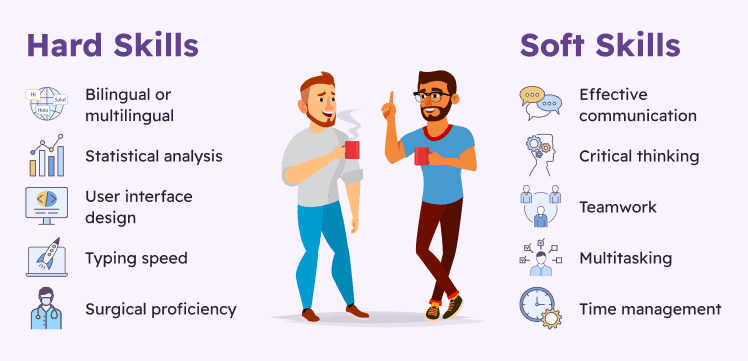

In the ever-evolving landscape of personal and professional development, understanding the distinction between hard skills and soft skills is crucial. Let’s learn more about this topic below with Pacman as we explore the real differences and their impact on success.
Hard skills and soft skills are two distinct categories of abilities that individuals possess and develop throughout their lives. While both are essential for personal growth and career advancement, they differ significantly in nature, acquisition, and application. Hard skills are typically technical, measurable, and specific to a particular job or industry. These skills are often learned through formal education, training programs, or on-the-job experience. Examples of hard skills include programming languages, data analysis, financial modeling, and operating specialized machinery.
On the other hand, soft skills are more intangible and relate to personal attributes, interpersonal abilities, and emotional intelligence. These skills are not job-specific but are transferable across various roles and industries. Soft skills encompass traits such as communication, leadership, teamwork, problem-solving, and adaptability. Unlike hard skills, soft skills are often developed through life experiences, self-reflection, and continuous personal growth efforts.
The importance of both hard and soft skills cannot be overstated in today’s competitive job market. While hard skills may get you through the door, soft skills often determine your long-term success and career progression. As we delve deeper into this topic, we’ll explore how Pacman, the iconic video game character, can serve as a metaphor for understanding the interplay between hard and soft skills in our personal and professional lives.
Hard skills form the backbone of professional competence in many fields. These skills are often the primary focus of educational institutions and training programs, as they provide the technical knowledge required to perform specific job functions. In the context of our Pacman analogy, hard skills can be likened to the game’s mechanics – the ability to navigate the maze, eat pellets, and avoid ghosts. These are the fundamental, measurable skills that determine a player’s basic competence in the game.
One of the key characteristics of hard skills is their quantifiable nature. They can be easily tested, measured, and certified. For instance, a programmer’s proficiency in a particular coding language can be assessed through standardized tests or practical coding challenges. Similarly, a graphic designer’s expertise in using design software can be evaluated based on their portfolio and the quality of their work.
Hard skills are often industry-specific and can become outdated as technology and practices evolve. This necessitates continuous learning and upskilling to remain relevant in one’s field. For example, a marketing professional may need to constantly update their knowledge of digital marketing tools and algorithms to stay competitive in the job market.
Some examples of hard skills that are highly valued across various industries include:
. Data analysis and interpretation
. Project management methodologies
. Foreign language proficiency
. Software development and coding
. Financial modeling and forecasting
. Search engine optimization (SEO) techniques
. Graphic design and multimedia production
. Machine learning and artificial intelligence
. Cybersecurity and network administration
. Content management system (CMS) expertise
While hard skills are crucial for performing job-specific tasks, they alone are not sufficient for long-term success in most careers. This is where soft skills come into play, complementing technical abilities with interpersonal and adaptable qualities.
Soft skills represent the human element in professional and personal interactions. These skills are less tangible than hard skills but are equally, if not more, important in determining an individual’s success and effectiveness in various life situations. Returning to our Pacman metaphor, soft skills can be compared to the strategic thinking, adaptability, and quick decision-making required to excel in the game beyond just following the basic rules.
Unlike hard skills, soft skills are not tied to a specific job or industry. They are transferable across different roles and sectors, making them invaluable assets in an individual’s career toolkit. Soft skills are often innate personality traits, but they can also be developed and honed through conscious effort, practice, and life experiences.
One of the challenges in assessing soft skills is their subjective nature. While hard skills can be easily quantified through tests and certifications, soft skills are typically evaluated through observations, interactions, and performance in various situations. This subjectivity can make it more difficult for individuals to showcase their soft skills on a resume or during a job interview, requiring more nuanced approaches to demonstrate these abilities.
Some key soft skills that are highly valued in both personal and professional contexts include:
. Effective communication (both verbal and written)
. Emotional intelligence and empathy
. Leadership and team management
. Adaptability and flexibility
. Critical thinking and problem-solving
. Time management and organization
. Creativity and innovation
. Conflict resolution and negotiation
. Self-motivation and initiative
. Resilience and stress management
The importance of soft skills has grown significantly in recent years, particularly with the rise of automation and artificial intelligence in various industries. While machines can replicate many hard skills, soft skills remain uniquely human attributes that are difficult to automate. This has led to an increased focus on soft skills development in educational curricula and professional training programs.
To illustrate the interplay between hard and soft skills, let’s consider how these concepts apply to the classic game of Pacman. At its core, Pacman requires a set of hard skills – understanding the game controls, knowing the rules, and mastering the basic movements. These are akin to the technical skills needed in any profession. However, to truly excel at Pacman, a player needs to develop soft skills such as strategic thinking, quick decision-making, and adaptability to changing ghost patterns.
In Pacman, as in life and career, success comes from effectively combining hard and soft skills. A player with excellent control (hard skill) but poor strategy (soft skill) may struggle to achieve high scores. Similarly, a professional with strong technical abilities but weak interpersonal skills may find it challenging to advance in their career or work effectively in team environments.
The Pacman analogy also highlights the importance of continuous learning and adaptation. As players progress through levels, they encounter new challenges that require them to refine their skills and strategies. This mirrors the professional world, where individuals must constantly update their hard skills to keep pace with technological advancements while also developing their soft skills to navigate increasingly complex work environments.
Understanding the distinction between hard and soft skills is crucial for effective career planning and personal growth. While both types of skills are important, their relative significance can vary depending on the industry, job role, and career stage. In the early stages of a career, hard skills often take precedence as individuals seek to establish their technical competence and gain entry-level positions. However, as professionals advance in their careers, the importance of soft skills typically increases, especially for leadership and management roles.
Many organizations now recognize the value of a well-rounded skill set that combines both hard and soft skills. This shift has led to changes in hiring practices, with employers increasingly looking beyond just technical qualifications to assess candidates’ soft skills and cultural fit. Some companies have even implemented specialized assessments and interview techniques designed to evaluate soft skills alongside traditional technical evaluations.
Given the importance of both hard and soft skills, individuals should strive to develop a balanced skill set throughout their careers. This balanced approach not only enhances employability but also contributes to personal growth and satisfaction. Here are some strategies for developing both types of skills:
For hard skills development:
. Pursue formal education and certifications in your field of interest
. Attend workshops, seminars, and conferences to stay updated on industry trends
. Engage in online courses and self-paced learning programs
. Seek out hands-on experience through internships or volunteer opportunities
. Participate in industry-specific projects or challenges to apply and showcase your skills
For soft skills development:
. Practice active listening and effective communication in various settings
. Seek feedback from colleagues, mentors, and supervisors on your interpersonal skills
. Engage in team activities or group projects to enhance collaboration skills
. Take on leadership roles in professional associations or community organizations
. Reflect on your experiences and interactions to identify areas for improvement
. Read books and articles on personal development and emotional intelligence
. Consider working with a coach or mentor to develop specific soft skills
It’s important to note that the development of soft skills is often a more gradual and ongoing process compared to hard skills acquisition.